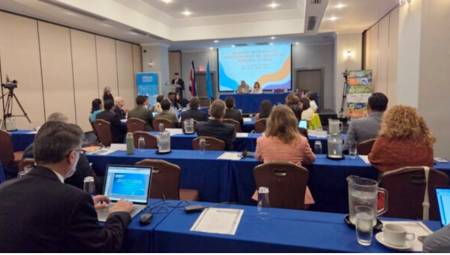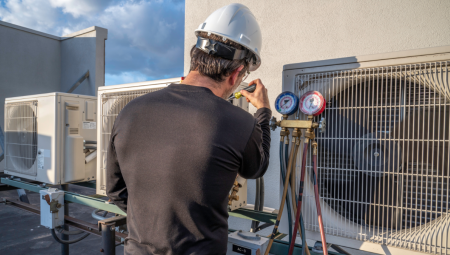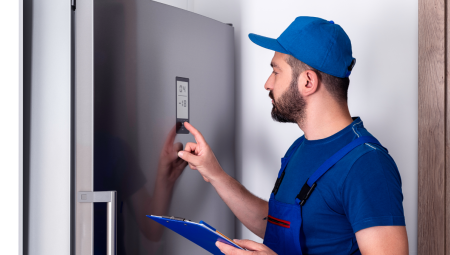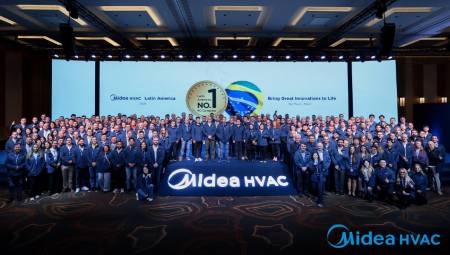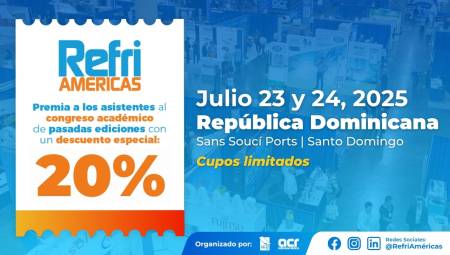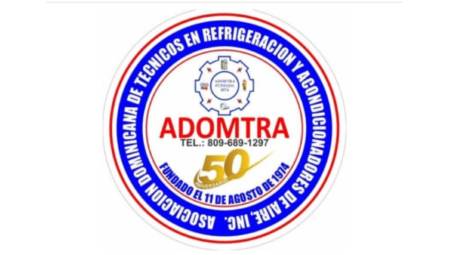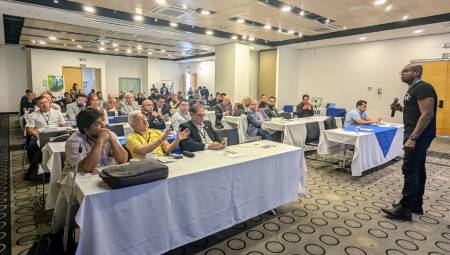by Julián Arcila
The economic and industrial world is upside down due to the global economic crisis of recent months. Although the air conditioning and refrigeration sector has not been directly affected, the low dynamism shown by the construction sector has impacted the figures of this segment. The positive aspect is that Latin America could turn out to be a clear winner in the approaching scenario.
This could be described as a conclusion of the last version of the AHR Expo exhibition, which was held in Chicago between January 26 and 28; although apparently the contest was smaller in size than, for example, the 2005 edition, which was also held in "the windy city", the organizers of the show claimed that in 2009 (more than 50 thousand people toured the halls of the show) it was larger in size than last year, held in New York.
It is important to note, however, that the CVAC/R still shows some dynamism, compared to other industries that have been more affected. As has been observed for several years, Latin America is a region on which many hopes are placed and of which it is still said that it has not felt the crisis in all its rigor.
The rattle sounds
But talking about the real impact of the economic crisis on the CVAC/R sector suggests a macro element with three different edges. We must think about the general impact, the consequences of this fact for Latin America and even the positive situations that have arisen due to this conjuncture. It is at this point that the opinions of the actors in the sector become important. AC/R LATINOAMÉRICA spoke with five companies, three of them North American and two Brazilian, to understand the direction in which the market is currently moving.
To begin with, it is important to say that for companies the crisis has had a real effect on the air conditioning and refrigeration sector. In this regard, José Mayaudón, responsible for the international sales of Bronz Glow, said that the impact of the current situation could be evidenced in the past ASHRAE show where there was an attendance that seemed lower than in previous years. "I would say that the crisis has been represented in a 25% reduction in sales, according to some manufacturers; fortunately it has not touched us," he said.
In line with this opinion, Rodnei Peres, from the export department of Full Gauge, assures that the crisis has generated an overall reduction in all economic areas, and stressed that the CVAC/R is not exempt. "Many of the big players are not making big investments as we were used to seeing, some for lack of credit and others waiting for what awaits them in the coming months. On a positive note, many companies are using this period to review many things such as where they are investing their returns and how to invest."
The Full Gauge official added that the large purchases that were usually made have stopped to acquire what is necessary to meet the existing demand. To this is added a positive aspect, and that is that the general economic situation is leading many companies to seek, at all costs, energy efficiency; recommends that pessimism cannot be allowed to take over the industry and slow down the economic wheel.
On the other hand, for Gilberto Rossato de Medeiros, commercial director of Globus, the reduction in sales has been observed since last December and notes that the fall has not been worse because there are many projects that were already being executed and that cannot be stopped. "It's like a train coming full steam ahead: it takes time to stop," he said.
Alfredo Manuel Sotolongo also referred to the moment that the industry is experiencing and said that Latin America has not felt the impacts of the economic recession so strong, but that this is a matter of time. "The strength of the impact is something that is yet to be determined," noted the vice president of Protec, Inc.
However, there are those who believe that the situation has benefited them, as is the case of Germán Flórez, vice president of the international division of National Compressors Exchange. In his opinion, the crisis has put compressor remanufacters on the scene, as customers are seeing in them an option to lower costs.
"Users traditionally chose the OEM because of the trust they have had in them and their products; generally the possibility of buying from remanufacters has been evaded because there are companies that have, in some way, affected our name. With this recession we are realizing that our product is being used more and more because it allows us to obtain savings of between 40-50%. This is benefiting us because we are finding the spaces to present our product to people who previously did not knock on our door because they doubted the capacity and quality of the product," he says.
A la carte strategies
To be faithful to business theory, in times of crisis you must resort to creativity. These days the option seems to be more pragmatic and is related to the control of operating costs, in the case of suppliers, and the reduction of energy consumption by consumers. Distributors, for their part, will gravitate to this scenario.
Alfredo M. Sotolongo agrees with the above and said that operating expenses have become a determining factor that is related to the increase in energy costs. The answer, he believes, will lie in an increase in energy-efficient designs by 2009.
For Gilberto Rossato, of Globus, a company that focuses much of its activity on the automotive segment -where there has been a significant reduction in sales-, the strategy will focus on caution, while continuing to invest in key areas such as R & D. "Moments of crisis can be times of many opportunities and we have to be prepared for this", Ensures.
Peres, from Full Gauge, agrees with the above and affirms that caution will be decisive in the coming months and added that "the strategies that must be taken into account are to look for the space left by those who are not going to adapt their products, invest better and in a way to bring results and look for new markets". Péres added that in his opinion 2009 will present a great contraction in demand.
Flórez, from National Compressor Exchange, suggests that the strategy will focus on improving customer service, this being one of the ways to sustain itself in an era in which great competitions are looming between traditional players and new ones that have been gaining ground.
Finally, Mayaudón assures that the government sector will be fundamental for the rescue of many companies affected by the crisis. "Those who have been affected and did not work with the government should look for ways to do so, because one of the areas in which we have seen the greatest commercial movement has been in government-funded projects," he says.
Legal changes
On the first of January, a regulation known as the Federal Decree of Independence and Energy Security of 2007 came into force, which seeks, among other things, to move the United States towards a policy of non-energy dependence with respect to fossil fuels, in addition to promoting the production of clean renewable fuels to protect consumers and make products, more efficient buildings and vehicles.
Several of the details of the standard have some relation to the CVAC/R sector (for more details search the network with the title Federal Energy Independence and Security Act of 2007), a topic for which we consult our sources.
For Rodnei Peres, this legal initiative will impact many companies. He assures that "many companies will be left out of the market quickly due to the resistance to change their projects; others will lose market for delaying to make this change. The initiatives were disseminated for quite some time and the companies had the necessary time to adapt their equipment." He added that this situation benefited them, since they had been working for some time on the development of solutions to meet these needs.
In contrast, José Mayaudón thinks that there will be no greater impact on the market, since companies have already been notified about this element and the proof of this is that many suppliers have been advertising in which they announce the launch of their ecological solutions.
Latin American Foresight
A question always arises that partially indicates what will be the conditions in which the region will move during 2009. As is often the case, there are more doubts than answers, however, the officials consulted gave their valuable opinions and with them some useful signals for decision-making.
Alfredo Sotolongo believes that the current situation will undoubtedly affect investments in Latin America. It ensures that global companies will allocate resources to the most stable markets. One situation that, he says, will arise is that some global companies will use their profits from the strongest markets to subsidize the affected markets, which in the end will affect the total numbers.
Gilberto Rossato agrees with the above and believes that investments have already begun to be affected in the region. He notes that although the situation is not as serious as in the United States and Europe, there are some signs to think that the market is contracting.
Mayaudón continues in the same line and explains that for the coming months the Latin market could be resented, this while the American market is rearranged. However, he believes that this situation will benefit some local markets such as Mexico, which may become a major manufacturer of cold solutions.
Peres, on the other hand, has noticed a significant reduction in investments in the region, which he considers counterproductive if one takes into account that Latin America is one of the regions of the planet with the best results in recent years. "I hope that in a short time these measures will be reviewed and they will return with investments," he says.
As can be extracted from the note, it is clear that the coming months will be complex, but with some room for maneuver. Energy-efficient solutions will continue to provide talk, either as a strategy for penetrating new markets or for reducing operating costs for end users.



